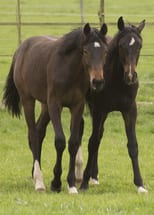Equine Rotavirus
 Equine rotavirus is the primary cause of viral diarrhea in foals, particularly those under 2 months of age. The younger the animal, the more likely the symptoms are to be severe. Equine rotavirus rarely infects mature horses. The illness results in loss of appetite, depression, and copious, watery, malodorous bowel movements. In most cases, the diarrhea lasts from 4 to 7 days, but occasionally it persists for weeks. Infecting the villi (small hairs) of the small intestine, the virus can result in dehydration and malabsorption if not treated promptly. As many as 50 percent of foals contract rotavirus, but, with appropriate veterinary intervention, mortality is kept below 1 percent.
Equine rotavirus is the primary cause of viral diarrhea in foals, particularly those under 2 months of age. The younger the animal, the more likely the symptoms are to be severe. Equine rotavirus rarely infects mature horses. The illness results in loss of appetite, depression, and copious, watery, malodorous bowel movements. In most cases, the diarrhea lasts from 4 to 7 days, but occasionally it persists for weeks. Infecting the villi (small hairs) of the small intestine, the virus can result in dehydration and malabsorption if not treated promptly. As many as 50 percent of foals contract rotavirus, but, with appropriate veterinary intervention, mortality is kept below 1 percent.
Transmission of Equine Rotavirus
Equine rotavirus is transmitted through ingestion of materials contaminated by infected feces. Unlike canine rotavirus, equine rotavirus is species specific and is not known to infect humans. Normally, adult horses do not develop symptoms of equine rotavirus, even if they test positive for the disease.
Vaccination Against Equine Rotavirus
Because very young foals are so susceptible and at grave risk from rotavirus, brood mares should always be vaccinated three times during each of their pregnancies, normally during months 8, 9 and 10 of gestation. Having been born to a vaccinated mare, and having suckled her colostrum, increases the foal's antibodies and decreases its risk of developing the disease. Even if such a protected foal does contract equine rotavirus, its symptoms are more likely to be milder.
Vaccinating other mature horses or the foals themselves against equine rotavirus does not seem to be effective in terms of prevention of the disease.
Other Protections Against Equine Rotavirus
In order to further protect foals from contracting the rotavirus, the following steps should be taken:
- Keeping foals from contact with manure of infected horses
- Disinfecting or separating tools used to clean stalls of infected animals
- Properly disposing of infected manure for at least 2 weeks
- Wearing disposable gloves when working with infected horses
- Using proper personal hygiene in situations that involve contamination risk
- Using bleach rather than other disinfectants to sterilize necessary areas
It is also important to keep horses that have been in contact with outside horses, through traveling or hospitalization for example, isolated for a couple of weeks upon their return.
Diagnosis of Equine Rotavirus
 Generally, fecal tests are used to diagnose equine rotavirus. Because the stool of an infected animal is watery and therefore dilute, it is necessary to test at lest three specimens daily. Since there are several possible causes for diarrhea in foals, fecal cultures for bacteria are usually performed on the same specimens to rule out other possible causes. Although test kits are available and can give quick results, it is always safer to have diagnostic testing performed by a veterinarian.
Generally, fecal tests are used to diagnose equine rotavirus. Because the stool of an infected animal is watery and therefore dilute, it is necessary to test at lest three specimens daily. Since there are several possible causes for diarrhea in foals, fecal cultures for bacteria are usually performed on the same specimens to rule out other possible causes. Although test kits are available and can give quick results, it is always safer to have diagnostic testing performed by a veterinarian.
Even though many viruses can be diagnosed through blood testing, this is not possible with equine rotavirus.
Treatment of Equine Rotavirus
In almost all cases, foals with equine rotavirus require veterinary consultation, if not actual inpatient care. Veterinary care is especially called for if pulse or respiration are abnormal, if the foal runs a fever, if its gums are pale, or if it shows any signs of dehydration.
Antibiotics are not helpful since this is a viral infection. Common treatments for equine rotavirus include:
- Gastrointestinal protectants, like Pepto-Bismol
- Probiotics to replenish helpful intestinal bacteria
- Intravenous fluids and nutrients (in severe cases)
- Anti-ulcer medications
Regular nursing care is necessary for any foal suffering from equine rotavirus. Because the skin of young animals is especially tender and because diarrhea is extremely irritating, the use of mineral oil or diaper rash cream after cleansing inflamed areas is recommended, both to make the animal more comfortable and to prevent secondary infection.
